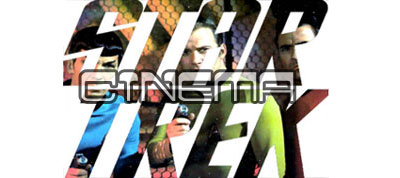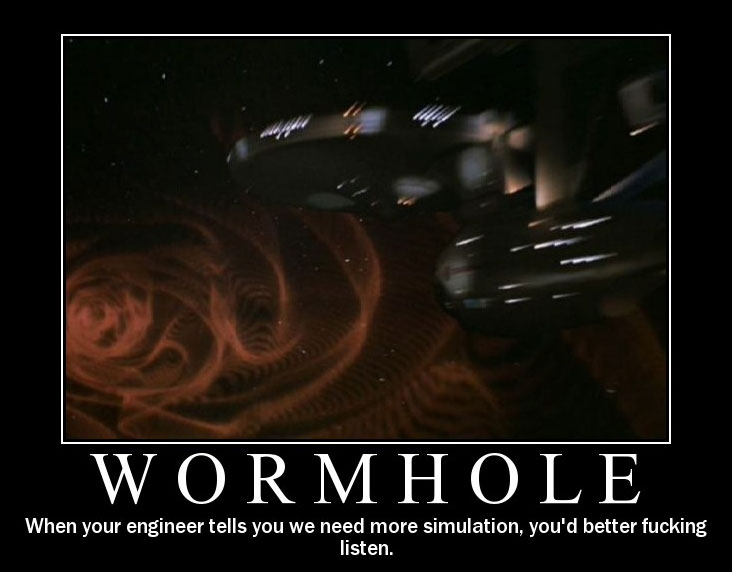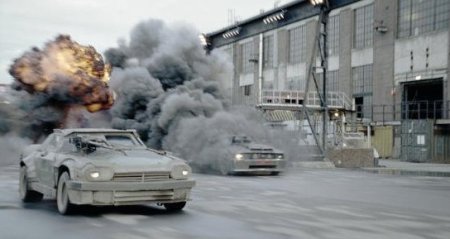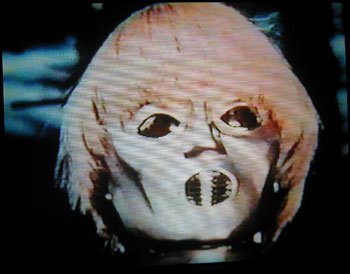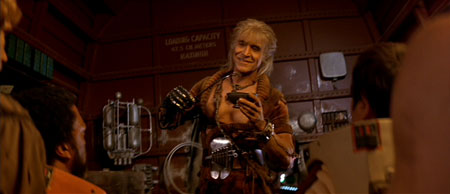Star Trek – The Motion Picture (1979)
Directed by: Robert Wise
Starring: William Shatner, Leonard Nimoy, DeForest Kelley, James Doohan, George Takei, Walter Koenig, Nichelle Nichols, Persis Khambatta, Stephen Collins
![]()
![]()
![]() 1/2 (out of 4)
1/2 (out of 4)
Warning: Spoilers Ahead

Here, take this crazy Vulcan Bling
I don’t believe Star Trek would have made it to the big screen without the success of Star Wars (this seems to be confirmed by Walter Koenig). We would have been given Star Trek Phase II, which I’m sure would have been a very cheesy slice of 70s retro sci-fi. Fortunately, we were spared that alternate history so that Paramount could bide its time until Patrick Stewart came along. Speaking as a fan of classic Trek, and most of the TNG Series
, I may surprise many of you when I say that The Motion Picture is one of the better entries in the Trek movie canon, ultimately only beaten out by Star Trek II in artistic quality. The hell, you say! Have I gone mad? Star Trek I, a good movie? Actually, yes, but I admit that this probably depends on what Star Trek means to you. I submit to you that Trek 1 is good because of scope and lofty ideas; director Robert Wise’s film stands as a shrine to Trek and shows his respect of what Roddenberry was trying to achieve.

Touch my woman, Kirk, and get bitch-slapped
Part of what I liked about Star Trek was exactly what Q said to Picard once: “That is the exploration that awaits you: Not mapping stars and studying nebulae , but charting the unknown possibilities of existence.” Sure, there was much of the Hornblower-in-space mentality in the original series, but I always felt that Roddenberry was just throwing a bone to corporate execs. When people think of classic Trek, they usually think of the cheesy sets and special effects. I tend to concentrate on the stories, many of which were morality plays and involved lost civilizations. It’s not surprising to me that the first two movies are pulled from TV episodes.
The Motion Picture is derivative of the classic episode The Changeling, which if you remember involved a thinking robot/machine called Nomad sent to destroy any life it deemed to be “imperfect”. In the movie, V’Ger takes the place of Nomad, but in this case V’Ger is an enormous living machine/entity, sent from a planet of living machines, with a simple mission: return to its creator. Naturally, the problem is that V’Ger thinks the creator is on Earth, and that humans are merely infestations getting in the way. This causes Starfleet to pull Kirk out of his Admiral’s chair to take command of a newly modified Enterprise, with the old crew in tow, including Spock, who has been trying to purge all his remaining emotions. An amusing scene has McCoy showing up, after being drafted, looking like a refugee from a 70s disco.

Somebody tell the DJ to play Rock The Boat!
The best way to enjoy this movie is to go with it. That means soaking in the impressive visual effects. The 5 minute sequence where Kirk and Scotty fly around the Enterprise in a shuttle goes on too long, but at least Wise is giving credit where it is due – he knows the Enterprise has a history. Kirk and Scotty (and the camera) practically worship the ship as a deity. In a way, it is understandable when V’Ger’s probe (in the form of a cute, bald Persis Khambatta) remarks that humans “infest Enterprise”, like mosquitoes buzzing around a God-like being. V’Ger itself is a wondrous piece of work. This is the only moment in the Trek movies where there is a real sense of wonder and scale.
TMP is respectful of Roddenberry in another way: its humanistic philosophy and atheistic existentialism. V’Ger starts its journey with a teleological crisis – it doesn’t find a purpose for its existence until it merges with Decker. As Kirk muses at the end “I think we gave it the ability to create its own sense of purpose, out of our own human weaknesses.” The ending is also a nod to 2001, in the way it suggests the possibility of human evolution as influenced by an extremely advanced alien race. A subplot seems influenced by Tarkovsky – the presentation of Ilia’s probe as being too perfect a clone of the original suggests Solaris
.

Go cry, Emo Spock
Two weaknesses of the film involve the drab color scheme of the Enterprise and its crew (uniforms have been changed to these boring grey, white, and brown jumpsuits, thankfully jettisoned for the rest of the movies) and a romantic subplot between first officer Will Decker and the Deltan Ilia. I should note, however, that Decker appears to have been a big influence on the Next Generation‘s Will Riker, from his interaction with the captain (pointing out alternative actions, even countermanding Kirk’s orders – we saw this in the Riker/Picard dynamic) to the romance with a very sexual alien (with vague psychic powers), which Riker of course had with Troi. The only thing missing is that Kirk never calls Decker “number one”. (Other notable influences on TNG are this movie’s opening theme and some episodes that were written originally for Phase II).
TMP is raw, unfiltered Trek. It takes its time and is the product of Wise’s skillful craftsmanship. It is very much a visual film. Its depictions of Vulcan and Klingon culture (while taking up a relatively small amount of screen time) are admirable in that it tries to make them authentically alien, right down to spoken language. I think it’s a misunderstood film. It’s more “clinical” than the sequels, but there are plenty of character moments if you pay attention, especially in the updated Directors Cut. (The Directors Edition has improved upon the theatrical release in so many areas, that it’s the only version now worth seeing.) I think TMP holds up much better today than a lot of the sequels. Just don’t go in expecting to watch shit get blown up; this isn’t a B space adventure, it’s a more philosophical and cerebral type of movie.
– Bill Gordon

We bet you can pull in good Klingon porn with this!
